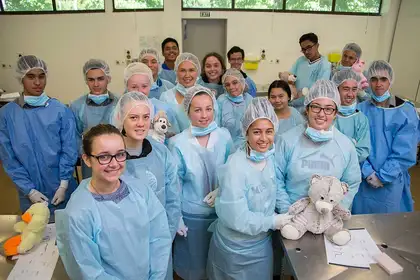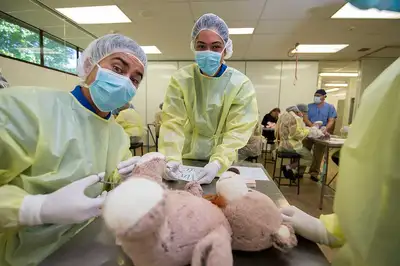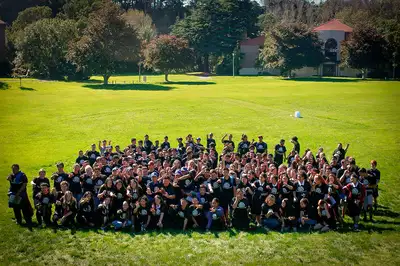
Academy students practicing sutures on stuffed animals as part of biology training.
A unique Massey University Academy that guides young Māori into careers in science has resulted in pass rates that surpass nationwide averages.
The Māori Science Academy’s Pūhoro programme began last year and is designed to guide secondary schools students through NCEA, prepare them for transfer to tertiary study and ultimately to employment in a scientific career.
The following results show the students’ performance (achievement rates) in core external achievement standards in NCEA level 1 physics, chemistry and biology.
- Chemistry (AS90944): Non-Māori: 67 per cent, Māori: 62 per cent, and Pūhoro students: 87 per cent.
- Physics (AS90940): Non-Māori: 74 per cent, Māori: 71 per cent, and Pūhoro student: 76 per cent
- Biology (AS90948): Non-Māori: 72 per cent, Māori: 64 per cent, Pūhoro students: 76 per cent
"We couldn’t be more proud"
Director of Academy Programmes Naomi Manu says that the prevailing narrative is that Māori students are over-represented among lower performing students in science programmes within secondary schools.
“We couldn’t be more proud of what our students have been able to achieve. This all started with a desire to see a new wave of Māori students given the tools to have an impact on Māori economic development in the sciences and see Māori leadership contribute to new developments in the 21st Century.
“These students have managed to not only close the achievement gap, but exceeded the nationwide pass rate in the core science subjects.
“It’s not just a win for us, or even just for the students, but for the whānau that supported their tamariki [children], the scientific industry who provided support, Massey lecturers and staff who have given their time and passion, and the countless others who have made it possible to give these students the best experience.”

Hato Pāora College pupils (Left) Joshua Hokianga and Rongomau Whaanga.
Up and beyond
Officially launched in January last year, the Pūhoro programme engaged 97 students and over 400 whānau, with participants representing 42 iwi throughout Aotearoa and comprised of schools in the Manawatū and Bay of Plenty regions. Schools include: Te Wharekura o Mauao; Murupara Area School; Te Kura o Kauwhata; Hato Pāora College; Feilding High School; Awatapu College; Manukura; and Palmerston North Boys’ High School.
This year the programme welcomed a further intake of 106 year 11 students and 86 returning year 12's at the first full academy workshop of the year where students launched water rockets and practiced dissection and suturing techniques.
However, despite its success, Ms Manu says the programme remains in a vulnerable position in terms of funding.
“To date, the programme has sufficient funding until December 2017, but further and longer-term investment is essential to protect the programme’s sustainability so that improved outcomes for Māori can be realised.
“Currently the programme is oversubscribed and students and whānau are frequently denied access to the programme. There is considerable scope to deliver this programme to a greater number of Māori students and their whānau throughout a greater number of regions. We already have programme demand in Hawke’s Bay, Gisborne and Bay of Plenty.
In 2016, Massey University pledged an investment of $1m over four years, but ongoing programme sustainability and growth relies on partner investment.

Entire Academy during their term one workshop.
Working within schools
Pūhoro Navigators work within schools to complete a tutorial/mentoring session once per week and one field trip per term. Throughout 2016, students attended weekly tutorial and mentoring sessions. Pūhoro delivered 124 tutorials and 45 mentoring sessions across eight schools.
Ms Manu says that tutorial sessions are designed to provide additional support outside of the students’ regular classroom settings.
“They provide an opportunity for Māori students to get to know one another, share knowledge, learn together and build whanaungatanga. Tutorial sessions are focused on NCEA provision and in particular the external achievement standards. The sessions are designed around student feedback about science topics or principles they struggled with in their regular classroom.”
The field trips are designed by working with schools, whānau, iwi, students, and industry sponsors to expose the breadth of career opportunities within the science and technology sector and allow students to contextualise learning through field trips and laboratory visits.
Student selection into the programme is based on student desire to join the programme and commitment to undertake the additional requirements including the tutorial/mentoring sessions. Students who are already excelling in science are not chosen; instead those who are on the cusp of success or who need extra help are admitted into the programme.
The programme is funded by Massey University and Te Puni Kōkiri with support from the Palmerston North City Council, Te Tumu Paeroa and the New Zealand Qualifications Authority.